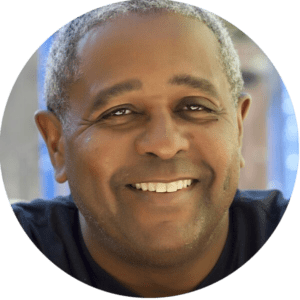Dean Jones
EMDRIA Approved Consultant and Trainer
A Transition Fueled by Passion and Purpose
Dean’s professional journey began in the information technology (IT) sector. Over twenty years, he gained valuable experience working for esteemed corporations such as Chevron, NEC Business Systems, Pacific Bell, and Wells Fargo. This experience instilled in him the importance of exceeding expectations and achieving excellence.
Throughout his time in IT, Dean actively sought opportunities for professional development. He pursued additional training and certifications from industry leaders like Microsoft and Cisco Systems. However, he also recognized the need for greater diversity in these environments.
Ultimately, a desire to make a lasting impact inspired Dean to rekindle a lifelong passion. The realization of the “Glass Ceiling” in corporate IT, coupled with a strong sense of responsibility to future generations, motivated him to pursue a different path.
A Passion for Healing and Social Justice
For nearly two decades, Dean Jones has dedicated himself to serving diverse communities in the mental health field. His journey began in 2004 at a San Francisco community-based organization, where he witnessed the profound impact of mental health services firsthand. Since then, Dean has worked extensively with individuals from all walks of life, including varying sexualities, age groups, socioeconomic backgrounds, races, genders, ethnicities, and cultures.
Dean’s experience spans multiple systems, including child welfare, juvenile justice, education (providing school-based mental health), local government, and hospital settings. He has treated clients with a wide range of needs, from mild to severe and persistent mental illness.
In 2021, Dean achieved a significant milestone by becoming one of the very few African American-approved EMDR Trainers and Consultants. This accomplishment was followed by another historic achievement in 2023: Mosaic Training Institute became the first African American EMDRIA-approved independent training program.
Anti-Oppression Approach and Building a More Inclusive Future
Dean is an anti-oppression psychotherapist who believes in healing from past, present, and potential future traumas. His central mission is to increase the number of BIPOC (Black, Indigenous, People of Color) clinicians trained in EMDR, thereby creating a more diverse and inclusive mental health field that can effectively serve all communities.
The Spark Behind Mosaic Training Institute
The profound need for culturally competent mental health services within BIPOC (Black, Indigenous, People of Color) communities became a major force driving me to become an EMDRIA-approved trainer. Throughout my career, I’ve seen firsthand the negative impact of training that lacked cultural context and general inclusivity. This often leads to a lack of awareness and unconscious biases that would often alienate BIPOC professionals. These biases contribute to feelings of isolation and marginalization during crucial training opportunities.
Mosaic Training Institute was born from a desire to go beyond simply welcoming clinicians of color. We strive to create a transformative learning environment that is mindful of the richness of everyone’s experiences and perspectives. This commitment ensures all mental health professionals, especially those from historically marginalized communities, are not only equipped with essential therapeutic skills learned in EMDR Basic Training and EMDR Advance training but also empowered to effectively serve their communities.
Why Mosaic Training Institute?
By understanding the unique challenges faced by BIPOC therapists, we can create a training space that is safe, inclusive, and supportive. At Mosaic, we believe in fostering honest communication, celebrating diversity, and equipping therapists with the culturally aware tools they need to make a real difference.
The type of training mental health professionals receive will have a significant impact on the future of the profession. As evidenced by the tenets of EMDR and its resonance with ancient indigenous healing practices, incorporating cultural and racial considerations alongside other social factors can foster a more holistic approach to mental health. This holistic approach can address various forms of trauma and social ills by promoting full participation in the development and advancement of mental health professionals. Ultimately, this may lead us towards answering the most fundamental question: who are we

